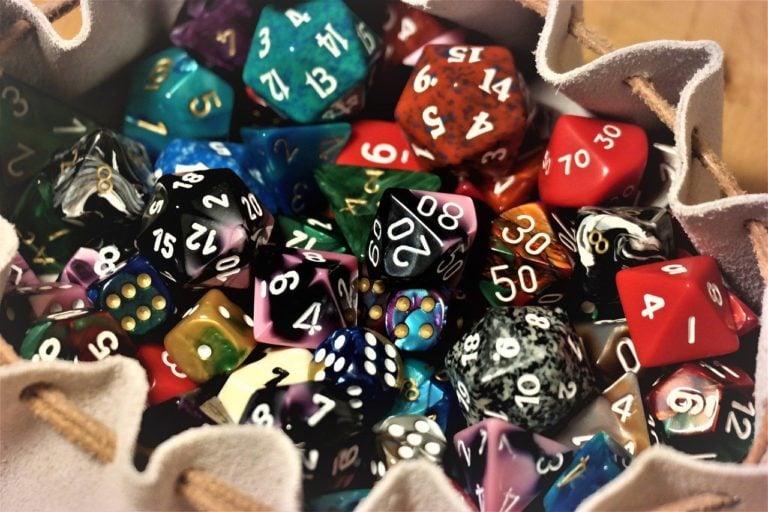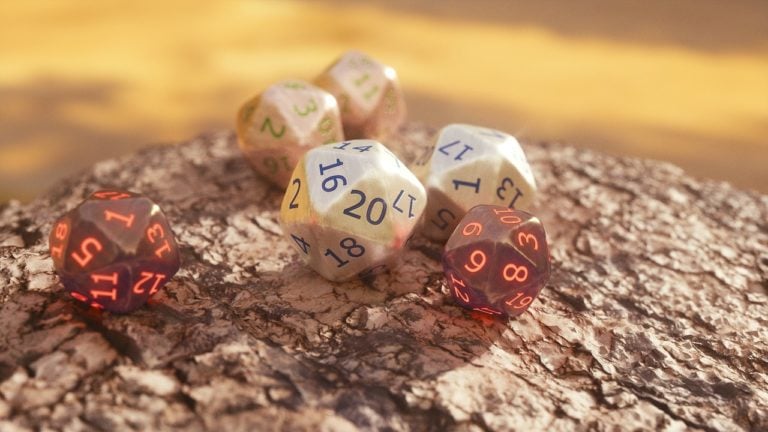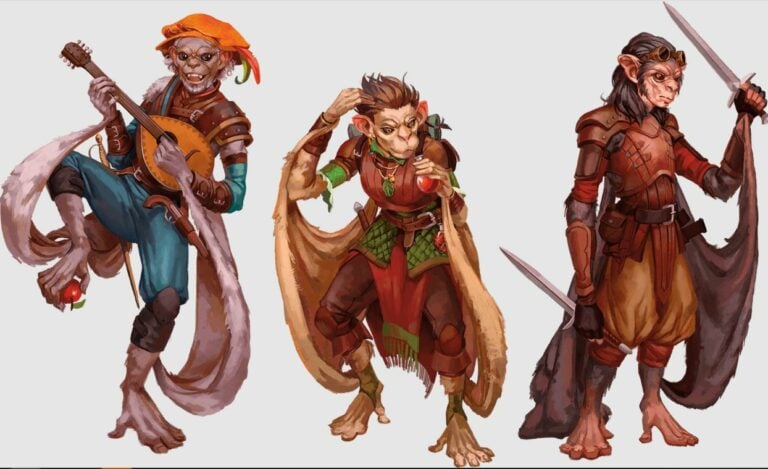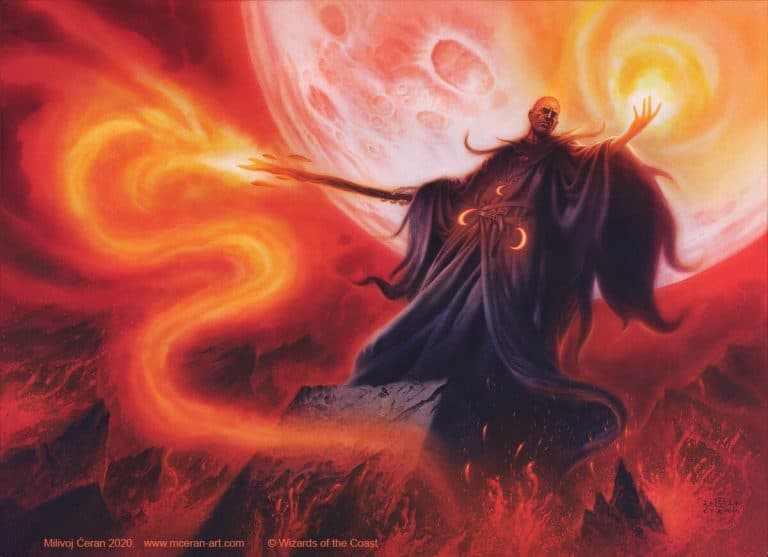Order Cleric 5E Guide | Rules, Tips, Builds, and More
The Order Domain is not an original Cleric Domain. Instead, it is included in The Guidmaster’s Guide to Ravnica. These clerics are officials and diplomats, using their connection to their god to establish their authority. The law is all that matters for them. Whoever is chosen to lead must be obeyed, or else consequences must ensue. These are the few pillars of hope against a chaotic universe… Or so they seem. These clerics can be good or evil, as long as they have a lawbook in their backpack. So let’s read the rulebook, and find out what the Domain has to offer in our Order Cleric 5E Guide.

Table of Contents
Are Order Clerics Good?
As a flavorful domain, the Order subclass is a buffet. All of the races have leaders of some type, so it makes sense for some of them to be religious zealots. In terms of mechanics, the Order subclass is about establishing your authority through buffs and enchantments. They are also bruisers, designed to deal damage on the frontlines instead of with magic. Leading by example, and forcing people to obey, will become your forte.
Domain Spells
The domain spells for Order are not necessarily fantastic. They mostly ensure that the Cleric has access to oh-so important Enchantment spells.
- 1st Level – Command, Heroism
- 3rd Level – Hold Person, Zone of Truth
- 5th Level – Mass Healing Word, Slow
- 7th Level – Compulsion, Locate Creature
- 9th Level – Commune, Dominate Person
Order Clerics focus on two things; enchantments and defense. Their spell list really capitalizes on this. Both Command and Heroism are fantastic spells. Command prevents targets from doing what they want on a turn. That means bosses can’t cast, deal heavy damage, or otherwise. Heroism prevents a large chunk of damage every round, and can prevent bosses that use Fear from doing anything impactful. These might be the best two spells on the list.
Hold Person, Slow, Compulsion, and Dominate Person are four more debuffs for the Order Cleric. They all either stop enemies from taking actions or completely take control of turns. Really potent, sometimes turn encounters around, but really require good Wisdom so your DCs are high. Target strong muscleheads for the most potent effects on these.
Zone of Truth is a weird one. It’s designed for out-of-combat but doesn’t actually force out truths without some help. Avoid using spell slots on this without some really smart planning.
Mass Healing Word is a good spell, but seems somewhat out of place on this list. Still, having such a potent spell always ready to go is a life-saver. You’ll be using this a lot when encounters get sour.
And finally, information spells. Locate Creature can really help solve some issues in town, letting you find kidnap victims and whatnot. Not really the kind of spell you want on your list all the time, but it’s usable. Commune is a great way to get information, since it’s so lenient and flexible. This is a much better information spell to always have available, though use it wisely; 5th level spell slots are strong, so use them on good questions.
Bonus Proficiencies
The Order domain refuses to be considered amongst the same level as other Heavy Armor domains. Firstly, Heavy Armor is already one of the biggest boons a Domain can get. Access to this means that you are now available for the frontline bruiser role, dishing out more damage than cantrips can normally give before level 5. Reliance on Strength means that there’s more room for Wisdom and Constitution without sacrificing AC. So, that’s certainly powerful.
Order also gets a bonus proficiency in a face skill; Persuasion or Intimidation. This is not necessarily a moral choice; an Evil Order cleric might have good use of Persuasion, while a good one might just be big and intimidating naturally. Clerics can take Persuasion naturally, so Intimidation is a slightly better idea, if you end up taking both. And then you wont need an Intimidation background… Maybe you were an acrobat instead.
Voice of Authority
The first ability that you get makes healing so much better, as well as any buffs you gain access to.
Starting at 1st level, you can invoke the power of law to drive an ally to attack. If you cast a spell with a spell slot of 1st level or higher and target an ally with the spell, that ally can use their reaction immediately after the spell to make one weapon attack against a creature of your choice that you can see.
If the spell targets more than one ally, you choose the ally who can make the attack.
This adds a huge effect to all of your healing and buff spells; after this spell takes effect, deal damage to an enemy. With luck, this damage will usually be from a Barbarian or a Rogue – sneak attack is once per turn, meaning your turn is a new one! – hitting an enemy as hard as they can. It’s a pretty major boost in damage most of the time, though any ally can do at least some damage with a weapon.
In the late game, lower-level spell slots become useful; this makes Level 1 Healing Words into a bonus attack for your allies. Fantastic!
This does become limited to the number of spell slots you have per day; you can’t use Guidance to trigger this. And, it also means that offensive spells now have a caveat to them; they need to be more useful than buffing an ally and potentially dealing damage. If that’s a problem, though, then it’s a really good one to have!
Channel Divinity: Order’s Demand
Time for the option of channel divinity, and you know it’ll be really charming!
Starting at 2nd level, you can use your Channel Divinity to exert an intimidating presence over others.
As an action, you present your holy symbol, and each creature of your choice that can see or hear you within 30 feet of you must succeed on a Wisdom saving throw or be charmed by you until the end of your next turn or until the charmed creature takes any damage. You can also cause any of the charmed creatures to drop what they are holding when they fail the saving throw.
Okay, this… Is pretty good! Not fantastic, but good. This is, at worst, an area-of-effect disarm. That’s not terribly useful against beasts or natural attackers, but against humanoids and demons… it’s strong. They’ll need to spend an action picking their weapons back up, and it could end boss fights that revolve around powerful weapons or rods.
The charm effect is somewhat weak. One turn isn’t a lot, even in an area of effect. And, if they take damage, they aren’t charmed anymore. That means that it might not even last until their turn. Sure, your allies could wait until the enemy skips their turn in the initiative with the charm effect, but… That’s metagaming. Don’t do that. Still, the charm works for bosses, and the disarm effect is strong, since it targets a save that not many weapon masters have proficiency in. Good stuff!
Embodiment of the Law
Just in case you were worried that Voice of Authority wasn’t good enough…
At 6th level, you become remarkably adept at channeling magical energy to compel others.
If you cast a spell of the enchantment school using a spell slot of 1st level or higher, you can change the spell’s casting time to 1 bonus action for this casting, provided the spell’s casting time is normally 1 action.
You can use this feature a number of times equal to your Wisdom modifier (minimum of once), and you regain all expended uses of it when you finish a long rest.
What a potent effect! As a reminder, this includes Command, Heroism, Hold Person, Compulsion, and Dominate Person. And those are just on your domain list! Bane and Bless can be sped up as well!
Of those, Heroism and Bless are the only two buff-based enchantment spells. They are really strong, and work well with Voice of Authority, but that’s limited. This is much better to use your bonus action in order to control your enemies and then do something with your action. A bonus action for Dominate Person or Calm Emotions can turn a fight quite quickly.
There are some downsides to this. 3-5 isn’t a large number of quickened spells, so that’s a pretty hard limit. Also, you still can’t cast two spells in the same turn – though you could cast a Cleric Cantrip – so this may only come in handy if you plan on crowd control. Having said this, raising efficiency is one of the strongest things a caster can do. The Order subclass gets two abilities which makes casting that much better. That’s absolutely tremendous!
Divine Strike
The level 8 damage increase is… Interesting, for this subclass.
At 8th level, you gain the ability to infuse your weapon strikes with divine energy. Once on each of your turns when you hit a creature with a weapon attack, you can cause the attack to deal an extra 1d8 psychic damage to the target. When you reach 14th level, the extra damage increases to 2d8.
Well, interesting by standards of Divine Strike.
Psychic damage is actually a relatively strong damage type. In the original Monster Manual, not many creatures resist Psychic, a few are immune, and one’s even vulnerable. The damage type is unique amongst domains for almost being akin to Force. You’ll find this to be very influential in deciding whether or not to use cantrips… Though, this will be weak against things without minds, like constructs, or things with minds too vast to comprehend, like Mind Flayers.
Order’s Wrath
And, just in case you were worried about Divine Strike not doing enough damage, level 17 has your back.
Starting at 17th level, enemies you designate for destruction wilt under the combined efforts of you and your allies. If you deal your Divine Strike damage to a creature on your turn, you can curse that creature until the start of your next turn. The next time one of your allies hits the cursed creature with an attack, the target also takes 2d8 psychic damage, and the curse ends.
Once per round, deal essentially 4d8 damage if you land a weapon attack. By now, landing weapon attacks should not be difficult for your weapon-based party members, so this is all but guaranteed.
It seems like just a boost in damage, but picture this; maybe your party member has a way of applying Vulnerability to all damage, like the Grave Cleric. You put the curse on, your party member uses this Vulnerability effect, and then your Paladin uses a Smite. That 2d8 damage could become doubled, in addition to a really strong attack. Or it could buff effects reliant on damage dealt, like concentration DCs.
In most cases, however, this will simply increase your Divine Strike damage. And that is not bad at all; You can use Divine Strike and cast devastating spells as a bonus action with Embodiment of the Law.

Best Race for Order Clerics
As we said above, all races have authoritative leaders. Does that mean all races have naturally gifted authoritative leaders? No, of course not! The Order Domain relies a lot on Strength, Wisdom, and Constitution to work the best it can. You could do a ranged build, but that makes your touch spells slightly less effective. Still, we definitely have our choices!
Hill Dwarf
The prodigal scion of Order is the Hill Dwarf. Heavy armor specialization already makes Dwarf a top pick. Add in extra health, proficiency with better weapons, and a beard which just screams leadership, and there are just too many reasons to pick this race. Constitution isn’t quite what you’re looking for in a perfect Cleric – Strength would have been preferred – but the bonus to Wisdom certainly is.
Firbolg
If your GM allows the Volo’s Guide character races, then the Firbolg may be the best option for you. +2 to Wisdom is already crazy good for a Cleric, and this one has Strength! There is a slight problem with flavor, since Firbolgs are naturally quiet and timid. You can make changes to your own; maybe your Firbolg encountered a war band and had to adapt, or maybe they use Disguise Self in order to make them look tough. With stats, innate size, and some unique powers, the Firbolg would make any god of Order proud.
Race Notes: Everyone Can Be a Leader
Order is a domain that likes Wisdom… A lot. But, they do have the tools to be a bruiser or a ranged build that requires decent weapon ability. Since no races decrease your Wisdom, we suggest simply… Choosing whatever you like. Bugbears can make fine clerics, if you’re okay with losing some casting ability. Warforged make good use of heavy armor… And you get to make Terminator references. Even Halflings can make a ranged weapon build useful, though you lose the ease of use that heavier armor has. Whatever fits your background can be really effective, as long as your stats are in the right place.
Order Domain Cleric Gods
As expected for the order domain, gods of law and keeping the peace will be your best options for worship. These types of gods are extremely numerous, and you won’t find a truly bad option in any campaign setting. Most Lawful gods have some order clerics working for them. What is important is that you find a lawful god that works for you and your party. That is, try to find a Lawful god whose alignment won’t make the rest of your party stab you in the back.
Asmodeus (Forgotten Realms)
Money. Power. Men and women. Spices. Luxuries. Travel and rest. All that and more can be granted, can be spawned, can be crafted. All you need to do is sign on the dotted line. With a flick of a pen and a drop of blood, the Supreme Master of the Nine Hells can grant even the most ridiculous and absurd of wishes… But, you must fall in line and listen to his demands. The contract shall not be broken.
Asmodeus is the Lawful Evil god of hell, the greatest of all devils. He holds domain over all of hell, and rules it with an iron fist. Thanks to his series of contracts that he has made and his legendary powers, he has never once faced an uprising strong enough to threaten him. His oration is legendary, and those who make a deal with him will never escape his grasp. He performs evil out of necessity, but uses order to gain power.
Worshipers of Asmodeus are either denizens of hell, or have made a deal with him at some point. Typically, those outside of hell go to Asmodeus accidentally, simply looking to make a deal with a devil for strength. Those who actively seek out Asmodeus’s strength will find themselves in the company of many like-minded tyrants. These people gain his power and spread his influence with an iron fist, in return getting the power they need to dominate others.
Order Clerics of Asmodeus
Order Clerics of Asmodeus act much the same, but focus more on the law side. While he grants them power, they are to use that power to rule as the top dogs of society. His name should be on the tip of their tongue in the right company, but never if it puts them out of power. Order Asmodeans are incredibly cunning, use the written word to gain immense power, and should understand how to talk in a way to get what they want. Asmodeus is the perfect lawful evil god for an Order Cleric. Find a god like him if you ever want to play the villain in the party.
Aureon (Eberron)
Bring out your books! Knowledge is not only power, friends. Knowledge is the cornerstone of civilization. Scholars are the most potent leaders, for who else knows of the failures of the past? Wizards can perform mighty deeds, and should be listened to. Magic and sorcery alike are critical to a realistic civilization, and the Sovereign of Law and Lore covers both aspects of that.
Aureon is the Lawful Neutral god of Knowledge. He banished the evil from his soul into the entity known as the Shadow, and thus dedicated his life to the development of lore. This quest for knowledge has led to folly, such as when the secrets of magic were brought to the Giants of Xen’drik. However, he holds the law books to every major civilization.
Worshippers of Aureon are similarly dedicated to lore and seeking knowledge. They tend to be magic users themselves, from Wizards to Clerics and even Sorcerers. They wander the world, learning what they can and teaching what is important for civilization. These wizards and clerics know the power of knowledge, and do not wish it falling into the wrong hands; be it good or evil ones.
Order Clerics of Aureon are not his preferred group of worshippers, but hold a vital place in any major civilization. They know all there is to the law of the land, and are the enforcers of law under Aureon. They work directly with guards to root out chaos and attempt to learn from their people about ways to make their civilization more effective.
Scripture gods like Aureon make a great neutral god option for the Order Domain.
Bane (Forgotten Realms)
Some Lawful Evil gods of the world are underhanded, sneaky, and nefarious with how they oppress others. They stick to the shadows, work underneath society until they have the power to strike. Not Bane, the Black Lord. Bane’s name itself causes tremors through anyone who hears it, forcing them to take a knee. The god of the Orcs rules with an iron fist, tighter than any hand of any other god.
Bane is a Lawful Evil god of tyrants, control, and pure ambition. He rules through hatred and fear, turning populations against each other until all that is left are those loyal to him. He values those that can find strength through bullying and loud vocals. And he works directly through his worshippers to finally achieve his mission; to control all of Faerun.
Worshippers of Bane follow his edicts to the letter. Be it from fear or ambition, these individuals work tirelessly to ensure that one of them becomes the leader of a community. They are direct dangers to any civilization they approach, as his Black Hand is hated by all. But, at some point, any civilization will fall to one stronger and more determined.
Order Clerics of Bane enforce his will indiscriminately. Any potential threats to his plan to survive and take down Faerun will be eliminated quickly. They do not need to be intelligent or careful; they simply must lead a group that is fully dedicated to his creed. Or, at the very least, a group useful to his creed. These clerics are his direct enforcers, his Hand. They represent him at the peak of their power, and must treat his magical gift with respect. Gods like Bane are too recognizable and cruel to be in most Dungeons & Dragons 5E campaigns. Try it out if you can!
Erathis (Dawn War)
The sound of the Lawbearer’s iron gavel crashes through a small courtroom. Her presence immediately felt by the guilty and innocent alike, making the former shiver and the latter stand tall. Her gaze is invisible, her knowledge unimaginable. With another crash, the verdict is made, and all know it was made in fairness and truth. For Erathis herself has watched over this trial, and none shall be falsely guilty in her eyes.
Erathis is the Lawful Neutral god of Civilization, Law, and Peace. She cares for little but the fair enforcement of law wherever it appears, be it in an orcish tribe or an elven utopia. She considers all fairly, whether good or evil, and gives them a fair trial. She is one of the most self-sacrificing of the gods, willing to risk it all if it defends the civilization that she helped create.
Worshippers of Erathis are leaders and judges of major or minor civilizations. These people hope to get an inkling of understanding of the laws and processes of the past, present, and future. They want to know fairness intimately, and care more about the law than good or evil. Because of this, these worshippers can appear unemotional or overly ambitious. But, few doubt their ability in the courtroom.
Order Clerics of Erathis are the crown jewel of her church. They must enforce law safely and carefully, so as not to ostracize those who might live on the edge of civilization. They must understand the importance of balance between nature and civilization, but always air on the side of progress and truth. They are the first and last bastion of law and order, and must respect their responsibilities. Erathis is the most basic goddess one can find for the Order Domain, but she is a safe choice.
Tyr (Forgotten Realms, Norse)
Justice is all. Would you risk life and limb for the pursuit of justice? Would you willingly put your family at risk to prove the system is just and pure? Is law all that can be thought of, all that can be understood? That sort of thought should run through the head of a Cleric of Tyr. While not that level of radical, the One-Handed god of order is not to be trifled with.
Tyr is a Lawful Good god of law and justice. He seeks this justice at all cost, to the point where the god was blinded and lost a hand in the pursuit of good law. As a lawful good god of law, he will not defend laws that would ever be seen as harmful to a society or group, and will pursue means to change laws for the better over time. He does not tolerate duplicity or wanton destruction. His promises are iron, and his words are pure.
Worshippers of Tyr must lead a vigorously lawful life, though not as self-destructive as the god they worship. Their goal is not to make the Material Plane a perfect, lawful utopia, but to do what they can to get it closer to that point. Tyr values those who seek perfection, though perfection will never be in reach of his followers.
Order Clerics of Tyr are as important to him as his missing hand. They are the ones who can best impose law on wrongdoers and liars. They are his will in the material plane. But, this level of responsibility can very easily drain an Order Cleric, and many of Tyr’s clerics will make mistakes out of fatigue or potentially fear. Perfect gods of order are hard to find, but Tyr is a great example of one!
Wee Jas (Greyhawk)
Many gods end up wearing many hats. But few can claim as many names as Wee Jas, the goddess of magic, law, death, and even vanity. Those from all over the world worship the Witch Goddess for a variety of reasons, and this can lead to her churches becoming a fraught state of affairs. But, as one of the primary gods of order in Greyhawk, she is not to be taken lightly.
Wee Jas is the Lawful Neutral goddess of magic, law, death, and vanity. As such, she respects the life cycle until it needs to be broken. Her relationship with undead is very loose, allowing necromancers to find her as useful as a politician. She is a great teacher, but wishes her domains could be closer to that of love, beauty, and romance.
Worshippers of Wee Jas divide into three sects. The good, bad, and neutral sects all learn different lessons from Wee Jas’s scriptures. The good work hard to destroy undead and research magic for resurrection. The evil believe that killing others and aiding them to the grave is critical to her plans. The neutral sect focuses on general magical research and even allows evil creatures to survive if they can grant them more power.
Order Clerics of Wee Jas should adore magical research, and even prioritize it. They should also see Undead as allies, rather than abominations, as Wee Jas herself is willing to raise lawful Undead for her bidding. These clerics often come from the Neutral sect, and thus can at times be willing to perform necromancy rituals if it aids them.
Wee Jas is a goddess of law in general, making her a great choice for Order. But, goddesses like her consider many, many different aspects of the universe to be theirs, so it can get confusing to make them work!
Best Feats for Order Clerics
Order Clerics are fantastic supporting casters. They should try to get their Wisdom to 20 as soon as possible to make their magic more impactful. However, the following feats can work well for them.
Chef
This is one of the funniest feats in the game, and it just has so much little stuff to it! To start, you can bump your Con or Wisdom by 1. Not a complete mitigation of the loss of the Attribute Increase, but it does smooth the pain.
You get proficiency in Cook’s Utensils, which basically just let you make a meal. Not bad, and has very minor survival applications. But, the meat is in the last two! You can make 4 + Proficiency Bonus creatures gain another d8 hit points after a short rest, as long as they spent a hit dice to heal. A lot of parties love to spam short rests, and this can make short rests more efficient.
In addition, after a long rest, you get to make your proficiency bonus worth of awesome cookies that, as a bonus action, your friends can eat to gain your proficiency bonus in hit points. Not super impactful, but every point of HP counts! And, at level 6, this is 36 HP for basically no cost. Not bad! Overall, it’s a bit niche and a bit cute, but surprisingly effective for parties that like to spam short rests.
Fey Touched
This is my favorite feat in the game. You get your Wisdom up by 1, partially mitigating the massive cost of taking a feat. Then, you learn 2 spells and get an extra spell slot for them. One is Misty Step, a second level spell that lets you teleport 30 feet as a bonus action. A fantastic use of a 2nd level spell slot, Misty Step solves problems, gets you into fights, gets you out of fights, and will constantly be a thorn in your DM’s side.
The other spell should probably be Silvery Barbs, a great level 1 counterspell that decimates your enemies and buffs your allies. Both of these spells are not on the Cleric spell list at all, making them great additions to your toolkit. Overall, a pretty great feat that’s almost worth not getting full Wisdom out of a level!
Metamagic Adept
Metamagic Adept is only here to be a 1/day Quick Action spell. Admittedly, this is insanely strong and can win you a fight, but it’s still only decent.
Thankfully, Quickened Spell is not the only thing you can get out of Metamagic Adept. There is also Extended Spell and Twinned Spell, which both go very well with your early Enchantment spells.
This is a rather small toolbox for your spell list, but being able to really decimate a fight with a limited resource will very often come in handy.
Resilient
This simple feat is a great way to boost your Constitution. It gives you +1 to any statistic and proficiency in that statistic’s saving throw. It’s not useful for Wisdom, and you shouldn’t boost Charisma anyways.
You can use this for Strength or Dexterity, depending on what weapon you decide to use. We don’t recommend this for Strength, since there aren’t too many Strength saving throws in the game. Dexterity is worth it, since many Dexterity saves deal good damage to you.
Constitution saves are very important for you. Constitution saves are one of the most popular spell saving throws and are used for Concentration saves. These make it very, very worthwhile.
Tough
This feat gives you 2 HP per level. That’s it. And that’s crazy! Tough basically “boosts” your Constitution by +4, but only for HP. This gives you 40 health at level 20, which is enough to survive 2 hits or 1 spell over what you’d normally be able to take. Since you’re a cleric, you’ll be able to use the Heal spell to bring yourself nearly to full health. This is a fine combo, but does nothing for your Concentration saves, which are also important. Pay attention to your Constitution and decide whether you just want health, or if you want Saving throw bonuses instead.
War Caster
War Caster gives three distinct benefits.
- Advantage on Concentration Saves. Great! Clerics have really strong Concentration effects, so you want to keep them around as often as possible.
- Can use Weapons or Shields for Somatic Components. No free hand? No problem! Usually not an issue, as many DMs will allow a cleric to cast with their hands full as long as their shield shows a Holy Symbol. If they don’t, then this feat is basically required.
- Can use a Single-target Spell for an Opportunity Attack. Crazy! This lets you cheat out magic every now and then for powerful spells like Dominate Person, Command, or Hold Person. This can swing a fight in your favor, and all that needs to happen is someone walking out of your Threatened range!
Weapon Master
This feat is iffy. You get +1 Strength or Dexterity. Since Order Clerics like attacking with weapons by level 8, this can do a bit to help your weapon attacks land. Then, you become proficient in 4 weapons. We recommend weapons with high damage, like a Greatsword, weapons with reach, like a Glaive, and ranged weapons, like a Longbow. These can vastly improve your damage and versatility, since you’d otherwise be stuck with Clubs and Crossbows. Admittedly, this feat is only a minor increase in damage, and you may want to consider multiclassing instead.
Multiclassing for Order Clerics
The multiclass options for Order Clerics are limited. This domain is a bit wary of other classes, like Monk or Druid, due to its reliance on Heavy Armor. Cleric also benefits a ton from focusing on leveling itself up, with a great spell list and good class abilities.
If you want some examples of decent multiclasses, here are some of our favorites.
Fighter
Fighter is great for the Order Cleric! At level 1, you get Martial Weapon proficiency, a Fighting Style, and a bonus action to heal. Great setup! The Fighting Style can be used for damage or, for a Ranged Order Cleric, can get you the ridiculous Archery style.
Then, at level 2, you get Action Surge, one of the strongest abilities in the entire game. Cleric spells are absurd, but two cleric spells in the same turn? That’s even better! Level 3 is not recommended. Eldritch Knight can be okay in theory, or Champion to deal a bit more damage.
Paladin
Paladin takes a ton of Charisma, 13 to be exact, but the payoff is crazy! Martial weapons are fine, Lay on Hands is okay, but at level 2… You get to deal so much damage.
Divine Smite is so fun for a Cleric, and is even in theme for an Order Cleric. The ability to drop 6d8 damage on someone’s forehead at the low cost of a level 5 spell is insane. Paladins were not designed with level 5 spell slots in mind! This is the best multiclass for any character that can afford the 13 Charisma cost. That bonus damage is completely absurd.
Ranger
Ranger is a weaker version of Paladin. Martial weapons are good as always, and you can get minor utility at level 1. At level 2, you get spells, which are genuinely strong weapon-based magic. Hunter’s Mark is fun, as is Entangling Strike. This is a lower power version of Paladin, but with almost no stat dedication to multiclass. A fine option, but really consider if it’s better than 2 levels in Fighter.
How to Play an Order Cleric
The Order Cleric is a hyper-aggressive combat-focused class. As with most Clerics, use your amazing spell list to solve problems by planning ahead with your party. You can save a few spell slots for combat spells like Shield of Faith. Order Clerics want to use weapon attacks, so try to keep your Strength or Dexterity high.
Out of Combat
- Your Spell List works out of combat. This goes for standard Cleric spells, but it also goes for enchantment magic. Command and Compulsion are both really good out-of-combat slots to spend. So is Locate Creature and Zone of Truth, depending on the situation.
- You have okay Intimidation and Persuasion. You can use these skills to talk people out of bad situations. If your party has a better Charisma caster, though, you may want to let them take the lead for most conversations.
- Order’s Demand can be used out of combat. This is a funny one. You can charm people within 30 feet of you. This can let you dodge a bad group of hostiles, or force a guard to drop their key. Remember that!
In Combat
- Learn enough buffs for Voice of Authority. Voice of Authority is really strong! Try to get enough buff spells so that your allies can spam weapon attacks. Also, make sure you’re in a position to see most enemies on the battlefield.
- Order’s Demand is Great. Charmed is a fantastic defensive option in an emergency situation, and forcing a Humanoid boss to drop their weapons is crippling to them.
- Use Embodiment of the Law to make more weapon attacks. Using Bonus Actions to cast enchantments is nuts. You can enchant an enemy into pacifism and then bonk another one with your weapon. A great combo that can make you the star of a fight! And you get a ton of these per day, so make sure you’re using them!
Use Weapons. Seriously. Blessed Strike and Order’s Wrath mean your weapon attacks deal 4d8 extra damage per round. 18 damage! Per weapon attack! That’s insane!
Order Cleric 5E FAQ
This section answers all your burning questions about playing an Order Cleric.
What Book is Order Domain In?
The Order Domain is one of the newest subclass offerings from Wizards of the Coast. You can find the Order Domain in Tasha’s Cauldron of Everything.
What is an Order Domain Cleric?
The Order Domain is dedicated to discipline. These deities represent devotion to the laws that govern society, institutions, or philosophy. Order Domain clerics ruminate on justice and logic as they serve their gods.
Conclusion – Our Order Cleric 5E Thoughts
The Order cleric is insane. With good domain spells, fantastic spell efficiency, and some above-average damage, this is a really good choice for any Cleric. There’s some pretty intense morality requirements, but that’s part of the fun. And it can be weak against enemies that are immune to enchantment, but those are few and far between. We really suggest taking this domain, and reap the benefits of the law. Want to see your other Cleric options or how to optimize your character in general? Check out our Comprehensive Cleric 5E Guide!






